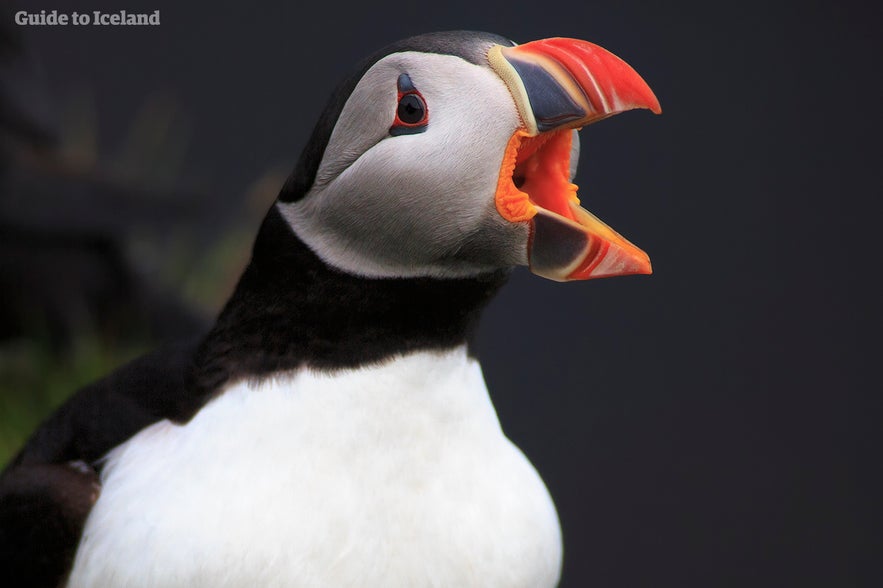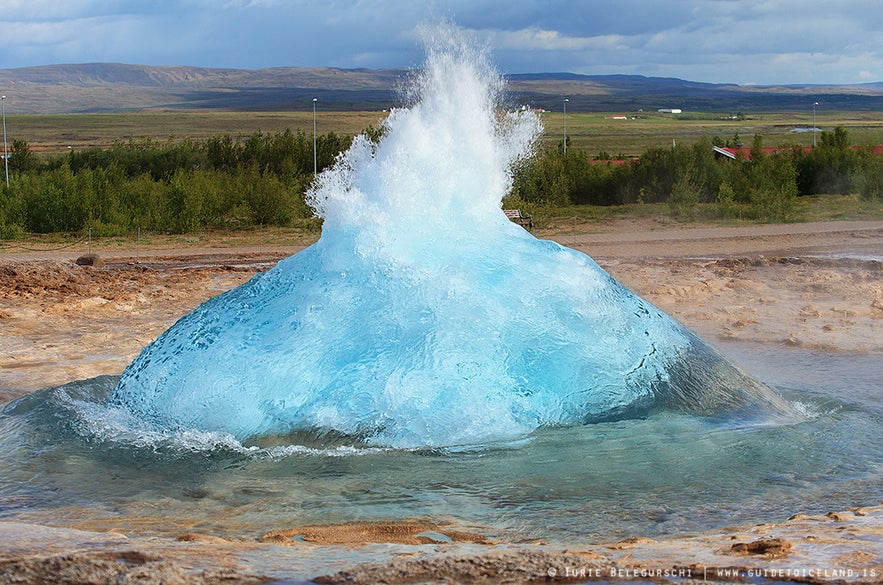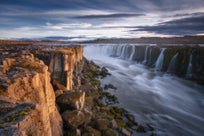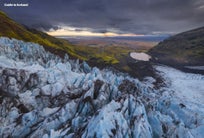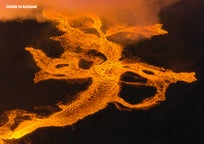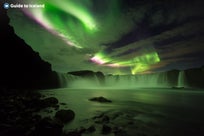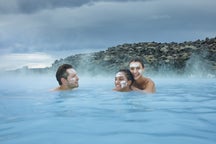
Icelandic Alphabet and Language Basics

- How to Pronounce Reykjavik
- How to Pronounce Eyjafjallajökull
- The Icelandic Alphabet
- What’s Up With All of These Long Icelandic Words, Like Eyjafjallajokull?
- Are There Any Similarities Between Icelandic and English?
- What’s Special About the Icelandic Language?
- The Icelandic Language is Popular
- Icelandic Phrases and Sayings
- Is Icelandic One of the Hardest Languages in the World?
- Useful Phrases in Icelandic for First Time Visitors
Is the Icelandic language difficult? How do you pronounce Reykjavik or, better yet, Eyjafjallajokull? How do you read the Icelandic alphabet? Are there any similarities between English and Icelandic?
- See also The 10 Weirdest Things About Icelanders
- Learn more in The Ultimate Guide to Icelanders
- Read more in 10 Reasons Icelanders are Proud of Iceland
- Become an expert with 10 Questions About Icelandic Names Answered
As a big fan of languages and especially the Icelandic language, I want to answer these questions and more. We’ll cover the Icelandic alphabet and the basics of Icelandic pronunciation, as well as some of the hardest Icelandic words and names.
Foreigners often complain over or admire the Icelandic language; however, almost everyone agrees that it’s difficult to learn. For first-time visitors, some of the Icelandic place names and people’s names can be tongue twisters.
Although some visitors get the hang of the Icelandic language, these words remain impossible to pronounce for others. Practically no one gets the hang of how to pronounce Icelandic names quickly, so don’t be too hard on yourself if you find it difficult. Icelanders are used to it and appreciate you trying, no matter how much you butcher their names.
Interesting trivia about Icelandic names: Icelanders don't use surnames; they just add -dottir (daughter) or -son (son) after one of their parent's first names, usually the father's. For example, my father's first name is Gunnar; therefore, I am Gunnar's daughter = Gunnarsdottir.
Hopefully, I can help you get started and make it look like less of a challenge than you think.
How to Pronounce Reykjavik
As the capital city and home of the country's primary international airport, Reyjavik is often visitors’ first and last destination in Iceland. As such, it would be nice to know how to pronounce the name of the city you are in, so let’s start with that.
Reykjavik is pronounced with an “a” and “ee” sound rather than the “e” and “i” used in its spelling. Written phonetically, it would look something like this: RAYK-YAH-VEEK. The name loosely translates as “Smoke Cove,” similar to the city’s nickname, Smoky Bay.
If you are still unsure how to pronounce Reykjavik, the video below may help.
How to Pronounce Eyjafjallajökull
When the Eyjafjallajokull volcano erupted in 2010, the entire world noticed, mainly because international flights were halted. I’m not going into details about that eruption.
However, one of the most entertaining things to come from that eruption was how news reporters and tourists butchered the pronunciation of the volcano: EYJA-FJALLA-JOKULL. There are some great examples in the videos below.
But is it that hard to speak Icelandic? I don’t think so, and I want to break it down for you as best as possible. I will only be translating between Icelandic and English and providing examples in these two languages.
The Icelandic Alphabet
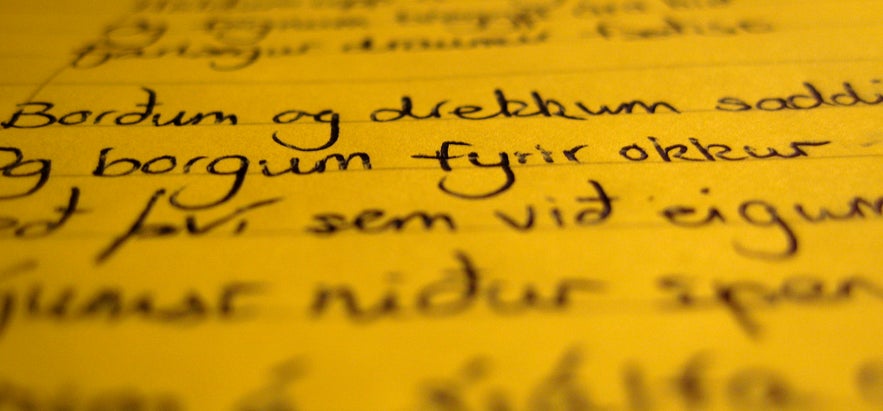 Photo from Wikimedia, Creative Commons, by Max Naylor. No edits made.
Photo from Wikimedia, Creative Commons, by Max Naylor. No edits made.
Let's start with the essentials, the Icelandic alphabet pronunciation. I have to say, the most irritating mistake I hear when people try speaking Icelandic is pronouncing Þ like a P (it’s NOT a P) or pronouncing J like the English way of saying J (with a sort of D sound). Please try not to do that.
Icelandic is a very phonetic language. When you’ve learned how to pronounce the letters, you can read and pronounce words correctly. The stress is always on the first syllable, and there are no silent letters, so the best tip I can give you is to enunciate.
There are 32 Icelandic letters:
Aa
Áá
Bb
Dd
Ðð
Ee
Éé
Ff
Gg
Hh
Ii
Íí
Jj
Kk
Ll
Mm
Nn
Oo
Óó
Pp
Rr
Ss
Tt
Uu
Úú
Vv
Xx
Yy
Ýý
Þþ
Ææ
Öö
Notice that there’s no C, no Q, no W, and no Z. All of the regular vowels (A, E, I, O, U and Y) have identical Icelandic vowels with a comma over them. This comma is not an accent but signifies a different vowel with a different sound.
In addition, the Icelandic alphabet has the vowels Æ and Ö. So, in total, there are 14 vowels in the Icelandic alphabet and 18 consonants.
Most letters sound the same in Icelandic as they do in English, but I will list the pronunciation of the odd ones out.
Ð – ð: This letter that looks like a D with a line through it when it’s a capital letter is sometimes confused for an Ó when it’s in lowercase. In fact, this letter sounds identical to TH in the word “the,” “they,” or “then.”
G – g: The letter G is identical to the English G in some words, such as “golf” (golf), “gata” (street), or “gefa” (give). Sometimes, there’s a soft pronunciation of the letter G, such as in “vegur” (way/road) or “skógur” (forest). This soft G is similar to G in the English words “thing,” “design,” or “campaign.”
H – h: The H is pronounced like a regular H in English – EXCEPT when it’s combined with a V, then it sounds like a K. This happens for example in all of our question words: “hvað:” kvath (what), “hver:” kver (who – or hot spring), “hvenær:” kven-I-r (when), “hvernig:” kvernig (how), “af hverju:” af kveryu (why).
J – j: The letter J presents people with some difficulties. It’s not hard to pronounce – but the pronunciation is not the same as English. The Icelandic J is pronounced like the English Y. A great example is “jójó” (yo-yo), that’s pronounced the same way. “Jól” (yule/Christmas) and “eyja” (island) are pronounced as “yol” and “A-ya.” The English word “jazz” is pronounced “djass” in Icelandic.
L – l: A regular L is pronounced the same as an L in English. The trouble starts when there’s a double L, such as in the word “jökull” (glacier). The double L has a slight click sound and can best be described as pronouncing it as TL (so, yökutl – more on Ö later).
R – r: The R in Icelandic is rolled. You can get away with rolling it just a little bit, but if you can roll it properly, you’ll be able to pronounce “Reykjavík:” RAkyaveek (smoky bay) like a local.
V – v: The letter V is pronounced like V in English or like a W. There’s no W in Icelandic, and most of the time, Icelanders won’t hear the difference between V and W. You can have fun with that. Ask them to talk about videos, VCRs, and other words beginning with a V in English.
Þ – þ: The famous Icelandic Þ. Þ appears in many words, most notably in “Þingvellir” (parliament fields) on the Golden Circle. This is NOT a P, so please don’t ever pronounce Þingvellir as Pingvellir. Or write it down like that. Þ is pronounced like TH in the word “thing” or “think,” and an acceptable way to write Þingvellir if you have no Þ in your keyboard is Thingvellir.
Æ – æ: Simply, Æ is pronounced like an uppercase I. Always. You can also remember it as sounding like YE in the word “bye” (bæ).
Ö – ö: Ö is different from O (pronounced like O in the English word “ought” or “fought”) and Ó (pronounced like the English O in “oh” or “over”). Ö is pronounced like U in the word “urn,” “murmur,” or “under.”
Additionally, the combination of a couple of letters makes them sound different.
These combinations are:
Au: When A is combined with U (AU), it’s pronounced differently. I can’t think of an example of it occurring in English, but it kind of sounds like a combination of Ö+I (öi).
Ei / Ey: The combination of E and I (EI) or of E and Y (EY) sound the same. And it’s pronounced like a capital A. Or AY in the word “way.” An Icelandic example is “eyja:” A-ya (island).
You can find more details on pronouncing the Icelandic alphabet on Wikibooks.
What’s Up With All of These Long Icelandic Words, Like Eyjafjallajokull?
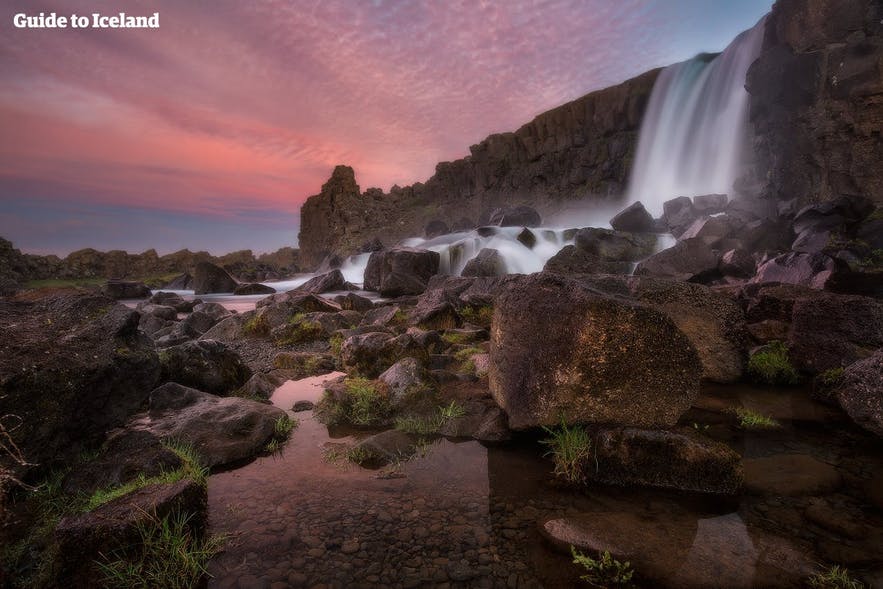
Eyjafjallajokull, Þingvellir, Kirkjubæjarklaustur, Jokulsargljufur, Egilsstadir, and Fjaorargljufur are a few of the difficult Icelandic words you’re likely to come across when traveling in Iceland.
All of these words are combined words.
Let's break down Eyjafjallajokull, probably the most internationally known Icelandic volcano after the 2010 eruption. This word consists of three separate words: “eyja” (island), “fjall” (mountain), and “jokull” (glacier).
So the daunting task of pronouncing Eyjafjallajökull is a little easier when you break it down, just as Islandmountainglacier would look like a tricky word to say if it were a single English word though it’s okay when it’s three separate words.
“Þingvellir” is composed of the words “þing” (parliament) and “vellir” (fields).
“Kirkjubæjarklaustur” is a combination of “kirkja” (church), the possessive form of “bær” (town), and “klaustur” (convent) = ChurchTown’sConvent.
“Jökulsárgljúfur” is three words, the possessive form of “jökull” (glacier), the possessive form of “á” (river), and the word “gljúfur” (canyon). Glacier’sRiver’sCanyon.
The town “Egilsstaðir” in the East of Iceland means Egil’s place, and Egill is a man's name.
Finally, “Fjaðrárgljúfur” means FeatherRiverCanyon.
As you can see, most place names in Iceland are very see-through. Eyjafjallajökull is indeed a glacier on a mountain on an island. The parliament used to gather at the fields of Þingvellir. And there used to be a convent at Kirkjubæjarklaustur.
Icelandic is not the only language that has a habit of combining words into a single long one. It’s also prominent in German, such as in the word “kugelschreiber” (Icelandic: kúlupenni, English: ball-pen). English also has many words combined, although there are seldom more than two (blacksmith, cheesemonger, heartache).
And then there's Welsh. The longest place name in Europe and second-longest one-word place name in the world is Welsh. And, unfortunately, no big news stories are coming from Llanfairpwllgwyngyllgogerychwyrndrobwllllantysiliogogogoch, because I would love to hear news reporters pronounce it.
Are There Any Similarities Between Icelandic and English?
There are PLENTY of similarities between Icelandic and English. Icelandic has at least two internationally known words: “Geyser” and “Saga.” The word “geyser” derives from Iceland’s biggest geyser, Geysir (found on the Golden Circle), and the Icelandic Sagas written in the 1200s are great examples of epic sagas. The word “saga” simply means “story” in Icelandic.
There are many more similarities between Icelandic and English words than just those two. Maybe you’ve seen some in the examples given above (“dóttir” = daughter, “jól” = yule, “gefa” = give, “vegur” = way).
According to the Icelandic sagas from hundreds of years ago, in Viking times, people in Iceland could converse with Scandinavian people and people living in England without any difficulty.
Iceland is an isolated country, and its language has stayed pure and close to its roots and is the closest you can get to Old Norse. The same cannot be said about English. For example, besides being influenced by Nordic languages, there are many French, German, Latin, and Greek influences in English, i.e., Rendez-vous, déjà-vu, Zeitgeist, biology, philosophy, zoology, curriculum vitae, etc.
The Icelandic language is quite similar to many old words in English. The term “you” was, for example, taken up in England quite recently and replaced “thou,” “thy,” and “thee” because it was more similar to the fashionable “vous” in French, which was spoken by the upper classes. “Thou” or “thy” isn’t too far off from “þú” (Icelandic for the singular form of “you”) and “thee” isn’t far from “þér” (a form of “þú” and the old way of addressing people politely).
There’s no “polite” way of addressing people in modern Icelandic, such as “Sie” or “Vous” in German and French. Everyone uses the word “þú.” On that note, everyone is also addressed by their first name, and never by their surname.
The word “eyja” (that you should be familiar with now) can be shortened to “ey” and still mean "island.” That would explain the names of the Orkney Islands and Jersey and Guernsey.
The English word “husband” doesn’t have an obvious meaning behind it, but it’s very similar to the Icelandic word “húsbóndi” which translates as “house farmer” or “man of the house.” “Húsbóndi” isn’t commonly used as a term for a husband in the sense of “man and wife” (or “man and husband”) in Icelandic anymore. That word is now “eiginmaður” (that translates to “a man of your own”).
Many English old place names are similar to Icelandic words, such as mountains with the word “fell” in them (i.e., Scafell Pike and Cross Fell) - an obvious connection to the Icelandic word for mountain: “fjall.”
There are also tons of similar words related to fishing and the sea, such as “gangvegur” (gangway), “skip” (ship), “bátur” (boat), “fiskur” (fish), “akkeri” (anchor), “sjór” (sea), etc.
- Read more about Iceland's History & Culture
What’s Special About the Icelandic Language?
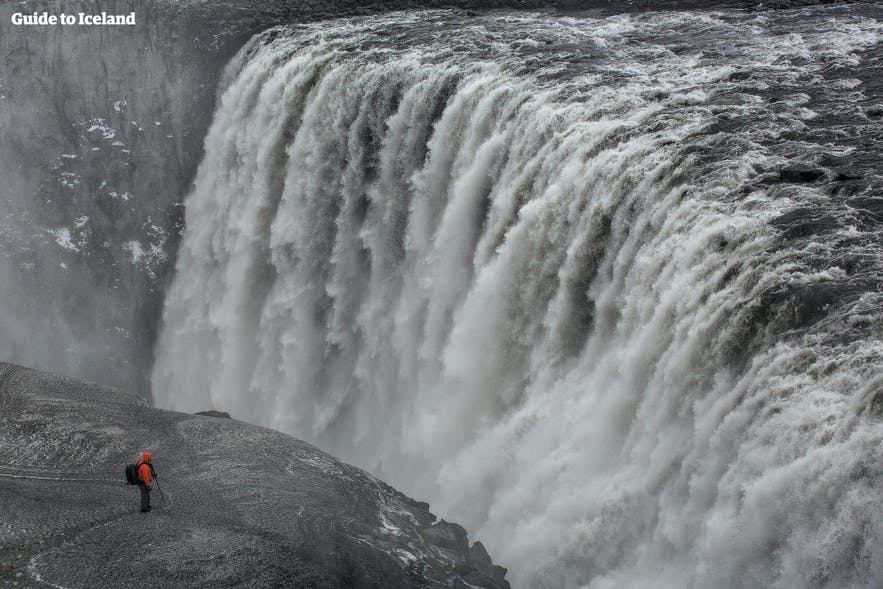
Icelandic is an ancient language that hasn’t changed much throughout the centuries. New Icelandic words are frequently invented, and, in theory, anyone can create a new word. A special word committee makes up new words for every new invention or slang that’s thrown our way. Some words have gained more popularity and are now used in everyday speech, while others don’t fare as well.
Although many languages use the same root of a word for new inventions (and old roots for words such as chemistry, biology, or psychology), Iceland is determined to make its own unique words for every word there is.
Many stable words such as “land” = land, “vín” = wine, “hús” = house, and “glas” = (drinking) glass are similar and easy to learn. On the other hand, newer words such as “tölva” (computer), “sjónvarp” (television), or “rafmagn” (electricity) are very different from one another.
The word for computer, “tölva” is a combination of the old term “völva” (fortune teller) and the T from the word “tala” (number). So, essentially, “computer” is “numeric teller” in Icelandic.
The word “sjónvarp” (television) is composed of the words “sjón” (sight) and “varp” (projection). “Rafmagn” (electricity) is composed of “raf” (electron) and “magn” (mass). So many words make total sense when you know the individual words within them, such as “ísskápur” (ice closet = fridge) or “frystikista” (frozen chest = freezer).
The Icelandic Language is Popular
I’m a big fan of the Icelandic language and think it’s enjoyable to speak. Icelanders are very proud of their language, and indeed there’s a 100 percent literacy rate in the country.
There’s also an endless amount of Icelandic books to discover. According to statistics, one in every five Icelanders will write a book in their lifetime. Before every Christmas, there’s a surge of new books being released, and this rush is aptly named “jolabokarflod” or “YuleBookFlood.”
- See also: Icelandic Literature for Beginners
Icelandic Phrases and Sayings
Iceland has many peculiar and fun phrases and sayings, and in every Easter egg, there will always be an old saying inside. Many people think that the expression inside their Easter egg is even more of a treat than the chocolate itself.
Many Icelanders make an effort to speak correctly and keep up to date on new words. A popular television series from 2013 called Orobragd plays with Icelandic words and dissects the language, and it was popular enough for a second series in 2015.
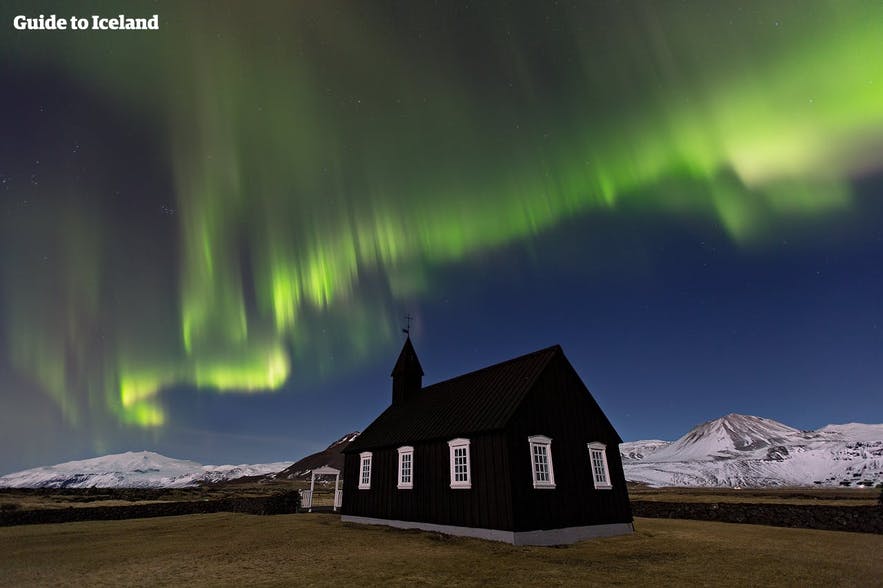
And you can read about new Icelandic words on the side of your milk cartons. The language is rich in words, but many words have double or triple meanings, meaning word puns are popular in (completely untranslatable) jokes.
Is Icelandic One of the Hardest Languages in the World?
Icelandic is known for being a hard language to learn. For Western Europeans and people with English as their native language, I dare say it’s still not that hard. (You might disagree.)
Sure, Icelandic has many forms, and words change a little depending on the sentence they’re used in. Sometimes, we speak on the in-breath, and we have more than a dozen words for “snow,” but it’s a very phonetic language, where letters always sound the way they sound (very different from English and French, for example, but similar to Spanish). The alphabet is Latin and familiar to Western European languages.
If you’re extremely good with languages, it’s even possible to learn how to speak Icelandic in just one week. This was proven by Daniel Tammet from the UK back in 2004.
Learning a new language is always hard. But if you already know English, Icelandic shouldn’t be too difficult, at least not as much as learning a language with a different structure and alphabet, such as Chinese, Arabic, or Russian. And as for European languages, Welsh has got to be more difficult than Icelandic!
There are some useful websites where you can learn Icelandic online, either for free or for a small fee. These include icelandiconline.com and italki.com. You can also learn Icelandic online or attend classes in Iceland at the Tin Can Factory. Their courses include visiting galleries or band rehearsals, cooking Icelandic recipes together, and more.
Useful Phrases in Icelandic for First Time Visitors
Halló - Hello
Hæ - Hi
Bless - Goodbye
Já - Yes
Nei - No
Góðan daginn - Good day
Góða nótt - Good night
Gaman að kynnast þér - Nice to meet you
Sjáumst (seinna) - See you (later)
Takk fyrir síðast - Thanks for last time
Takk sömuleiðis - Thanks, likewise
Takk - Thank you
Takk fyrir mig / Takk fyrir matinn - Thank you for dinner
Verði þér að góðu - You're welcome
Velkomin / Velkominn - Welcome
Hvað kostar þetta? - How much does this cost?
Hvar er næsti hraðbanki? - Where is the next ATM?
Einn bjór, takk - One beer, thanks
Skál - Cheers
Ég ætla að fá ... - I'm going to have ...
Gæti ég fengið vatnsglas? - Could I have a glass of water?
Ég er að læra íslensku - I am learning Icelandic
Ég tala reiprennandi íslensku - I speak fluent Icelandic
Hvernig berðu þetta fram? - How do you pronounce this?
Ég heiti ... - My name is ...
Ég er frá ... - I am from ...
Hvar er ráðhúsið / Harpa / Hallgrímskirkja? - Where is the city hall / Harpa / Hallgrímskirkja?
Mælir þú með góðum veitingastað / bar? - Do you recommend a good restaurant / bar?
Hvað er fiskur dagsins? - What’s the fish of the day?
Hvað er réttur dagsins? - What’s the dish of the day?
Veistu símanúmerið hjá ...? - Do you know the phone number for ...?
Ég elska Ísland / Björk / Sigur Rós / þig - I love Iceland / Björk / Sigur Rós / you
Inne interesujące artykuły
Akureyri, stolica północnej Islandii | Kultura, historia i pomysły na spędzenie czasu
Zdjęcie: Ludovic Charlet Jaka jest historia Akureyri, drugiego co do wielkości miasta na Islandii, które bywa nazywane północną „stolicą” kraju? Ile osób obecnie tam mieszka i jakie atrakcje można...Czytaj więcejSylwester na Islandii
Jak wygląda Sylwester na Islandii? Jak wygląda Sylwester w Reykjaviku? Co sprawia, że Sylwester na Islandii jest wyjątkowy? Gdzie są najlepsze imprezy sylwestrowe w Reykjaviku? Dowiedz się wszystki...Czytaj więcejNajlepszy przewodnik dotyczący ślubu na Islandii
Chcesz zorganizować swój ślub na Islandii? Co trzeba zrobić przed zawiązaniem węzła małżeńskiego na Islandii? Planujesz prywatny ślub lub szukasz islandzkich pakietów ślubnych? Czytaj dalej, aby d...Czytaj więcej

Pobierz największą platformę turystyczną na Islandii na telefon i zarządzaj wszystkimi elementami swojej podróży w jednym miejscu
Zeskanuj ten kod QR za pomocą aparatu w telefonie i naciśnij wyświetlony link, aby uzyskać dostęp do największej platformy turystycznej na Islandii. Wprowadź swój numer telefonu lub adres e-mail, aby otrzymać wiadomość SMS lub e-mail z linkiem do pobrania.
